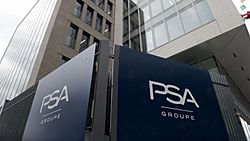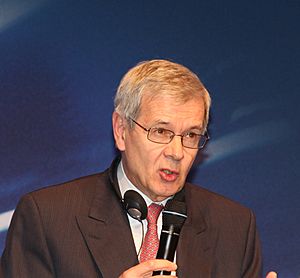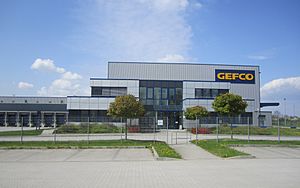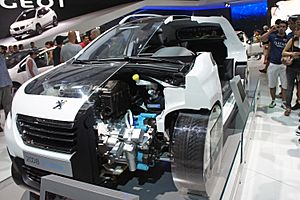PSA Group facts for kids
 |
|

Head office in Rueil-Malmaison
|
|
|
Trade name
|
Groupe PSA |
|---|---|
|
Formerly
|
PSA Peugeot Citroën |
| Public (Société Anonyme) | |
| Traded as | Euronext Paris: UG |
| Industry | Automotive |
| Fate | Merged with Fiat Chrysler Automobiles to form a new company called Stellantis |
| Predecessors | |
| Successor | Stellantis |
| Founded | Paris, France April 1976 |
| Founder | Citroën, Peugeot |
| Defunct | 16 January 2021 |
| Headquarters |
,
France
|
|
Area served
|
Worldwide |
|
Key people
|
|
| Products |
|
| Brands | |
|
Production output
|
|
| Revenue | |
|
Operating income
|
|
| Total assets | |
| Total equity | |
| Owners |
|
|
Number of employees
|
209,000 (2019) |
| Subsidiaries |
Car companies
Automotive parts
Financing
Other
International divisions:
|
The PSA Group, also known as Peugeot S.A., was a big French company that made cars and motorcycles. They were known for brands like Peugeot, Citroën, DS, Opel, and Vauxhall.
In 2019, the PSA Group and another car company called Fiat Chrysler Automobiles decided to join forces. They merged on January 16, 2021, to create a brand new company called Stellantis.
Peugeot was the largest brand within the PSA Group. The company's shares were traded on the Euronext Paris stock exchange. In 2016, PSA started a plan to grow bigger by expanding into new countries and buying other car companies. They planned to enter markets like India, America, and Canada.
The PSA Group's main office was in Rueil-Malmaison, France. In 2018, they sold about 3.88 million vehicles, making them the third-largest carmaker in Europe. By 2019, Groupe PSA was the ninth-largest car company in the world.
Contents
History of the PSA Group
Buying Citroën and Chrysler Europe
In 1974, Peugeot S.A. bought a part of Citroën. By 1976, they owned most of Citroën, which was having financial problems. This is how the PSA Group was formed. PSA stands for Peugeot Société Anonyme, which means Peugeot Public Limited Company. Citroën had some popular new car models at the time, which helped the new PSA Group do well financially from 1976 to 1979.
Later, in 1978, PSA bought Chrysler Europe for a very low price. Chrysler Europe included older car brands like Rootes and Simca. PSA decided to create a new brand called Talbot for these cars. However, this purchase caused big money problems for PSA from 1980 to 1985.
The Talbot brand for passenger cars was stopped in 1987. Cars that were supposed to be Talbots, like the Talbot Arizona, became Peugeot 309s instead. PSA even started making Peugeots in the UK for the first time. The Talbot name was used for commercial vehicles until 1992, then it was stopped completely.
Overcoming Challenges (2012–2014)
In 2012, PSA announced a big partnership with General Motors (GM). GM became PSA's second-largest shareholder. The goal was to save money by sharing car parts and buying things together.
However, PSA still faced difficulties. In July 2012, they announced they would cut many jobs in France. By December 2013, General Motors sold its share in PSA.
In 2014, two new owners stepped in to help PSA financially. Dongfeng Motor Group, a Chinese company, and the French government each bought a 13% share in PSA. This helped the company recover and reduced the Peugeot family's ownership.
Growing Bigger and Stronger
After getting help from Dongfeng and the French government, PSA started to do much better. They began making a profit again in 2015. A new CEO, Carlos Tavares, helped the company by cutting costs and creating new car models for all their main brands. They even launched a new brand called DS Automobiles.
In 2016, PSA announced plans to re-enter the North American car market, which they had left in 1991.
Buying the 'Ambassador' Brand
In 2017, PSA teamed up with CK Birla Group in India. They formed a joint company to sell Peugeot, Citroën, and DS cars in India. PSA also bought the famous Ambassador car brand from Hindustan Motors.
Buying Opel and Vauxhall Motors
In February 2017, PSA announced they were planning to buy Opel and Vauxhall Motors from General Motors. GM had been losing money in Europe for many years. In August 2017, PSA completed the deal and bought both Opel and Vauxhall.
Carlos Tavares, PSA's CEO, met with leaders in Germany and the UK. He promised to protect jobs and keep factories running. He also said that Opel would keep its German identity and that Opel and Vauxhall cars would be sold outside Europe for the first time in a long time.
Merging with Fiat Chrysler Automobiles
In 2019, Groupe PSA announced its plan to merge with Fiat Chrysler Automobiles (FCA). This was a huge deal, worth about $50 billion. On January 4, 2021, both companies' shareholders approved the merger. The deal was completed on January 16, 2021, creating a new company called Stellantis. The name Stellantis comes from a Latin word meaning "to brighten with stars."
How the PSA Group Operated
The Peugeot, Citroën, and DS Automobiles brands worked together. They shared technology, car development, and factories, but they had separate sales and marketing teams.
Developing Markets Around the World
PSA worked hard to grow its business in many fast-growing countries. They invested a lot and partnered with companies in South America, Iran, and China. They also opened new factories in India, Kazakhstan, Tunisia, and Morocco.
PSA PowerTrain (Engines)
PSA PowerTrain makes petrol and diesel engines. They supply engines to many car companies, including Ford, Jaguar, BMW, and Land Rover. They also worked with BMW to develop the 1.6 Prince engine, which won the "International Engine of the Year" award eight times.
Faurecia (Car Parts)
PSA owned a large part of Faurecia, a company that makes car parts. Faurecia provides many parts, especially interior and exterior pieces, to Peugeot, Citroën, DS, and other carmakers like Audi, BMW, and Mercedes-Benz.
Gefco (Logistics)
Gefco is a big international company that handles logistics, which means moving goods and products. Peugeot started Gefco in 1949. In 2012, PSA sold most of its share in Gefco to Russian Railways, but Gefco remained PSA's main partner for moving its products.
Peugeot Motocycles
Peugeot Motocycles makes mopeds and scooters. Most of this company is owned by India's Mahindra Group, with Peugeot owning the rest.
Financial Services
PSA also owned Banque PSA Finance, which offered financial services to help people buy their cars.
Working with Other Companies
PSA often worked with other car companies through joint ventures. This means they created new companies together to build specific vehicles or parts.
Sevel SpA
PSA Group and Fiat equally owned a company called Sevel. They built factories together, like Sevel Nord and Sevel Sud, to make different types of vehicles, including vans like the Fiat Ducato, Peugeot Boxer, and Citroën Jumper.
Dongfeng Peugeot Citroën Automobile
PSA had a joint venture with the Chinese company Dongfeng Motor Corporation. This partnership started in 1992 and built Citroën and Peugeot models in factories in China.
Peugeot Citroën Mitsubishi Automotiv Rus
In Russia, PSA partnered with Mitsubishi Motors to build a factory in Kaluga. This factory makes Mitsubishi cars like the Outlander and Pajero Sport, as well as Peugeot and Citroën models.
IKAP (Iran Khodro Automobiles Peugeot)
PSA also had a joint venture with Iran Khodro in Iran, which started in 2016. This company produced some Peugeot models and imported others for the Iranian market.
Past Joint Ventures
- Toyota Peugeot Citroën Automobile Czech: PSA worked with Toyota to make small city cars like the Citroën C1, Peugeot 108, and Toyota Aygo in the Czech Republic. This partnership ended in 2020, and Toyota took over the factory.
- Changan PSA: PSA had a joint venture with the Chinese Chang'an Automobile Group to produce DS Automobiles brand cars. This partnership ended in 2020.
Where PSA Group Was Located
Head Office
The main office of PSA Group was in Rueil-Malmaison, France. It was a large building where about 700 employees worked.
United Kingdom Operations
In the United Kingdom, Peugeot Motor Company PLC was a part of PSA Peugeot Citroën. It managed the Peugeot, Citroën, and DS Automobile brands in the UK.
Other Factories Around the World
PSA had many factories and development centers globally. Their biggest factory was in Vigo, Spain. They also had a factory in Portugal that built its millionth vehicle in 2012. PSA also invested in new plants in India and Tunisia. In 2018, Groupe PSA opened its North American headquarters in Atlanta, Georgia, USA.
Cool Cars and Inventions
Hybrid Air Technology
The PSA Group showed off an experimental engine called "Hybrid Air" at a car show in 2013. This engine used nitrogen gas, compressed by energy from braking, to help power the car alongside a regular gasoline engine. This technology was meant to make cars much more fuel-efficient, especially for city driving.
Awards for PSA Group Cars
Cars from Peugeot, Citroën, Chrysler Europe, and DS have won many awards over the years. They won the "European Car of the Year" award ten times! They also won many "Car of the Year" awards in Italy, Spain, and Ireland.
Here are some of the cars that won the "European Car of the Year" award:
- 1969 – Peugeot 504
- 1971 – Citroën GS
- 1975 – Citroën CX
- 1976 – Simca 1307-08
- 1979 – Simca Horizon
- 1988 – Peugeot 405
- 1990 – Citroën XM
- 2002 – Peugeot 307
- 2014 – Peugeot 308 II
- 2017 – Peugeot 3008 II
- 2020 – Peugeot 208 II
|
See also
 In Spanish: Groupe PSA para niños
In Spanish: Groupe PSA para niños
 | Roy Wilkins |
 | John Lewis |
 | Linda Carol Brown |





